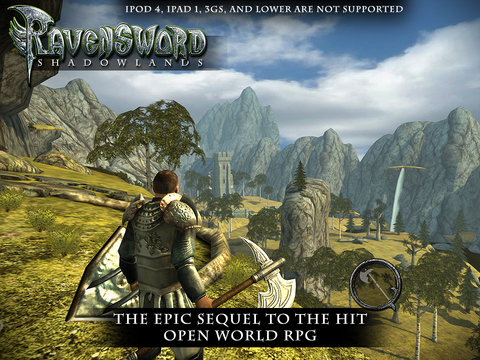Ravensword: Shadowlands Review
- Publisher: Crescent Moon Games
- Genre: Entertainment
- Released: 20 Dec, 2012
- Size: 828.6 MB
- Price: $6.99


PROS
- Large, varied environments; only marred by their general sparseness.
- Easy to pick up combat mechanics; generous lock-on for ranged players and multi-target strikes for melee players to exploit.
CONS
- Sharp initial difficulty curve made all the more challenging by a jack-of-all-trades character.
- Too many bugs to enumerate; thankfully very few were game breaking.
VERDICT
Ravensword: Shadowlands has great potential that's crushed beneath obfuscated mechanics, odd interface design, and a slew of bugs that should have been removed before its release; no doubt updates will smooth things out, but until then the game remains a beautiful disappointment.
- Full Review
- App Store Info
Sometimes I wonder, "Do I expect too much of games on my mobile phone?". It's a valid question as the platform is undoubtedly a novel one and prone to requiring many shortcuts to make traditional genres succeed. Whether it's something as obvious as the control issues inherent to the touch screen, or something less consider like trying to pack in as much action between text messages and phone calls, a developer's job is not an easy one. However, no matter where you fall on the issue, one thing is clear: An unfinished game is almost universally undeserving of praise.
And here we sit with Ravensword: Shadowlands, the much awaited sequel to Crescent Moon Games' original Western Action-RPG, and we wonder how such a tangled mess of bugs, poor writing, incomplete interfaces, and all manner of quirky gameplay decisions could have been released in to the wild.
First, lets take stock of what's on offer and what it means for iOS gamers. Shadowlands is, for the most part, a generous helping of Elder Scrolls: Oblivion alike gameplay, complete with roughly defined skills, statistics, weapons and spells to earn, steal, or loot from the expansive world. Players aren't given much choice about how to play the early portion of the game - mostly melee weapons and shields unless you pilfer a game-breaking blunderbuss in the first town - with specialization occurring much later on.
Don't get too excited though, the options are fairly mundane - increased damage with the weapons of your choice; higher experience or gold; minor perks for using stealth; etc. The game sets you up as a jack of all trades and that's much how your character ends up feeling once you dash past the main talents required for your playstyle.
Much like any RPG there's a numbers game played out behind the scenes, but it's one you're not given much of a chance to understand. Weapons increase their damage numbers over time; armor gets bulkier and its stats increase too, but at no point are you told how useful those numbers are. Enemy health bars are essentially a shroud for how much damage they can absorb, and the player stats are reduced to four basic numbers, given little in the way of meaning as you struggle to work out how useful a single point (which is all you're given after leveling up) is to your character.
The longer you play, the more the game's sins pile up: Food is never adequately explained, so you'll automatically eat with no idea of why you're eating or what it's doing (quick note: once you're out of food you'll slowly 'starve' reducing your natural health regeneration - you're not afforded the chance to regulate this action); creatures regularly clip through the environment, count as obstacles while dead (until they dissolve), and even prevent you from stealthing despite being a corpse; occasionally you'll earn a defense point for simply being in combat; some creatures seem to have projectile fists that can hit you despite being out of range; and your weapon is regularly 'sheathed' for you despite wanting to keep it out to prevent a time-wasting 'drawing' animation.
All of this and more awaits you, and yet... and yet it still remains ambitious in its design; epic in its scope; and grand in its execution. Ravensword: Shadowlands may be a failure, but it's a magnificent failure that, given enough patience and forgiveness, remains without peer on the platform. Had these problems been dealt with before release, the game would easily be a contender for the best game the App Store has seen for a while, but as it is it's a sad reminder about how far a game can fall.













 $6.99
$6.99












